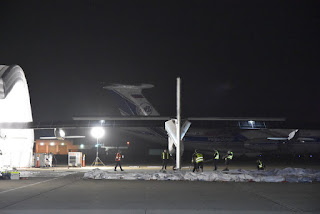Last week, when I had the privilege to see the Solar Impulse 2 up close, I was thrilled. Absolutely, thrilled.
Maybe, just maybe, I could see it fly. There would be a good view, I expected, from the Stevens Creek Trail. With enough advance warning, it seemed possible. Not likely, perhaps, but possible.
The best view? From the tarmac.
And that is just where I was, from about 2:40 a.m. until shortly 5 a.m.
You see, somehow, I scored a golden ticket.
The air was still, the sky was dark, the plane was lit. A crescent moon glowed orange as it rose above the horizon.
The invitation welcomed us starting at 2 a.m., with take-off planned for 5 a.m. I pulled up at Moffett's main gate at 1:57 a.m., right behind the satellite van for KPIX, San Francisco's CBS affiliate.
It would be a while before they led us out to the viewing area, but I strode ahead of most of the pack and planted myself in a prime position. From which I would not budge for the next few hours.
I had a front-row ticket that money couldn't buy.
Ground crew members were stationed beneath each wing, to support it with a pole until the plane lifts off the ground. The cockpit door was loaded onto a pickup truck, to be affixed later, after the plane was positioned on the runway.
Human handlers “taxi” the plane. Most of the inflatable hangar had already been taken down. The ground crew pulled the plane out, turned it around, and brought it close. The pilots spoke to us, then took questions from the media before getting on with flight preparations.
Electric bicycles are used to keep pace with the plane, especially during landings. One was strategically parked to prevent anyone from damaging (or being damaged by) the spear-like projection on the plane's nose. (Antenna? Sensors?)
The plane would not take off any earlier than 5 a.m.; its batteries were fully charged, but it would be important to maximize solar exposure during the next leg of its journey (to Phoenix, Arizona). The inflatable hangar is made of a special material that allows the solar panels to charge, and sunshine had been abundant during its sojourn at Moffett. The plan was to land with fully-charged batteries, as the panels would not be exposed to the sun in Phoenix.
Little had I understood, when I originally hoped to watch the plane from the nearby trail, that it would take off before dawn.
The tower at Moffett crackled alive at 4 a.m. Precisely. We were able to follow along, thanks to a spectator near me who tuned in to the tower's radio frequency. Solar Impulse 2 would head straight out over the bay, turn toward the east and climb to 3,000 feet.
And so we waited. We could see a strip of lights down the runway; the wings remained lit. The pilot was ready at 5 a.m., but air traffic control announced a hold.
Once cleared for take-off, there was no more waiting. The wings went dark, then lit up like a bright string of pearls and started advancing. Even in the darkness, it was evident that the plane started lifting almost immediately. The propellers whirred softly as it passed us, aloft, and the crowd sent if off with a cheer.
Pilot André Borschberg thanked the tower for Moffett's hospitality, and the pearls vanished into the morning fog.
Bravo!
Subscribe to:
Post Comments (Atom)













No comments:
Post a Comment